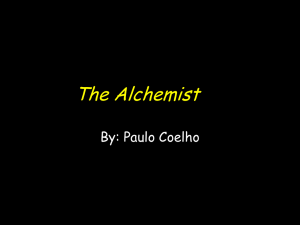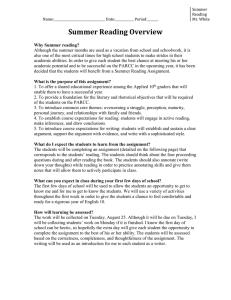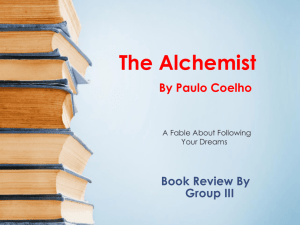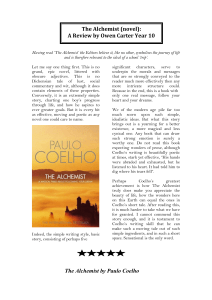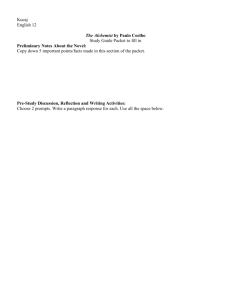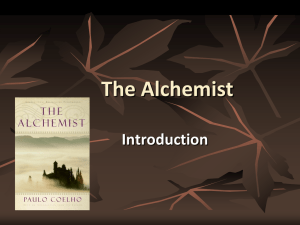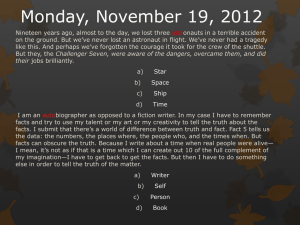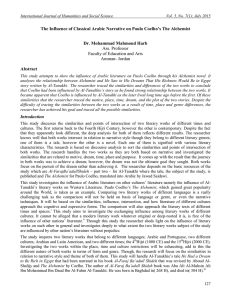The Alchemist Introduction Notes
advertisement
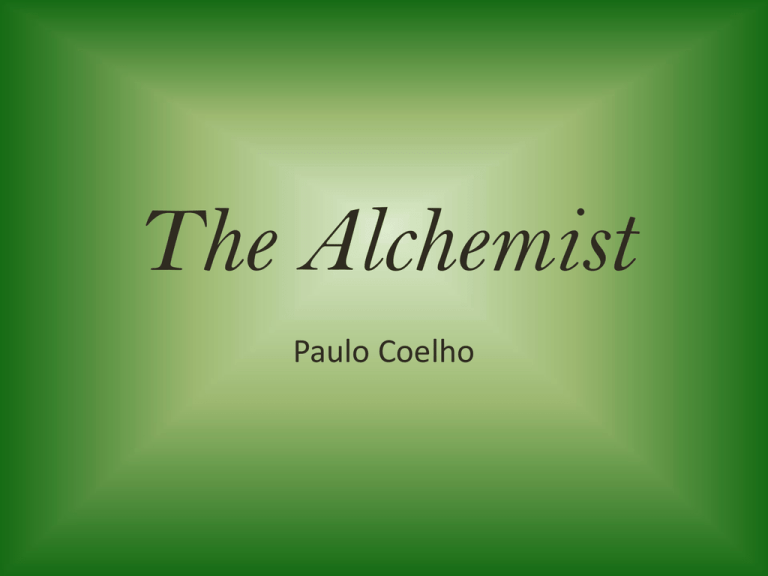
The Alchemist Paulo Coelho Paulo Coelho • Born August 24, 1947 Rio de Janeiro, Brazil • Middle class home – Father was an engineer. Mother was a homemaker. • Went to a strict Jesuit school. • Dreamed of becoming an artist. – Parents wanted otherwise. • At 17, his father had him committed to a mental institution—twice—both times receiving electroconvulsive therapy. Paulo Coelho • Non-conformist • Hippy and seeker of the new • Took part in the peace and love movement in Brazil in the late 1960s • Seeking spiritual experiences, he traveled all over Latin America. • Became a lyricist and helped transform the Brazilian rock scene. • In 1973, he joined the Alternative Society calling for more freedom of expression Paulo Coelho • He, along with other members of the organization, was kidnapped and tortured by paramilitaries for two days for his views and beliefs. • After this profoundly influential event in his life, at age 26, decided to tone himself down. • Coelho had a vision of a mysterious man whom he met two months later at a café in Amsterdam. • The man suggested that Coelho return to Catholicism and study the benign side of magic. • He also encouraged Coelho to walk the Road of Santiago de Compostela, the medieval pilgrims’ route. Paulo Coelho • In 1987, a year after his pilgrimage, he wrote The Pilgrimage: Diary of Magus. – Describes the discovery of the extraordinary that occurs within the ordinary’s life. • A year after The Pilgrimage, he wrote The Alchemist. – Sells more copies than any other book in Brazilian literary history. – Translated into 56 different languages – 20 million copies – Talks about our personal calling Personal Legend • God’s blessing—the path that God chose for us on earth—our own personal legend. • When we do something that fills us with enthusiasm, we are following our legend. • Many people do not have the courage to follow their dreams. • Coelho presents four reasons: Four Obstacles: Disbelief 1) We are told from childhood that we can be anything that we want to be. Then when we get older, we are told that everything we want to do is impossible. • • • We start to believe it Creates layers of prejudice, fear, and guilt. Sometimes we bury our personal legend in these layers so deep that it appears to be invisible, but it is still there. Four Obstacles: Love 2) We know what we want to do, but are afraid of hurting those around us by abandoning everything in order to pursue our dream. • • • Love should propel us forward It should be our fuel that keeps us going We do not realize that those who genuinely wish us well want us to be happy and are prepared to accompany us on that journey. Four Obstacles: Fear of Defeat 3) We fear defeats on our path. • • • • We who fight for our dreams suffer more from failure because it was something we truly desired. We must be willing to have patience in difficult times, even though we may not understand how. The “secret of life” is if we fall down 7 times, we get up 8. Sometimes in life, it is the intense unexpected suffering that passes quicker than the apparently bearable pain that could persist and eat away at our soul for years; eventually it leads us to a bitterness that we will try to hold on to for the rest of our lives Four Obstacles: Fear of Success 4) We come to fear realizing the dream for which we fought all our lives. • • Is it really what I wanted? Do I deserve it? • • • • We can be filled with guilt, and some give up their dream for a form of sacrifice. Renouncing our dreams is the most dangerous because it has a saintly aura about it: renouncing joy and conquest. But our dream is who we were MADE to be. We are worthy of our calling, our legend, and our dreams.
